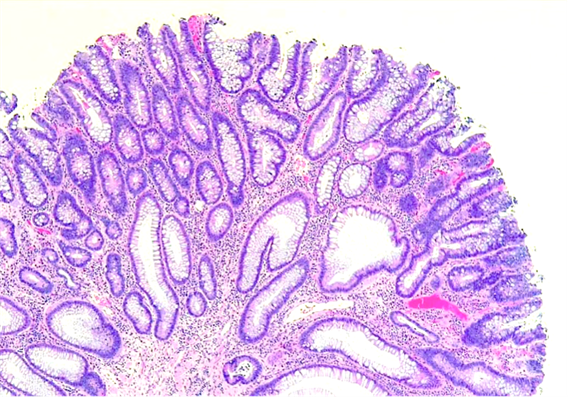Sox9 protein enables molecular time travel that can lead to colorectal cancer
RESEARCH SUMMARY
Study Title: Aberrant cell state plasticity mediated by developmental reprogramming precedes colorectal cancer initiation
Publication: Science Advances: March 29, 2023, 2:00pm ET https://www.science.org/doi/10.1126/sciadv.adf0927
Dana-Farber Cancer Institute author: Pratyusha Bala, PhD, Jonathan P. Rennhack, PhD, Daulet Aitymbayev, MS, Matthew B. Yurgelun, MD, William C. Hahn, MD, PhD, Nilay S. Sethi, MD, PhD
Summary:
Normally the lining of the colon forms a series of steep hills and valleys. At the surface, where the hills peak, are functional colon cells that do the organ’s work of absorption and secretion. Deep in the valleys are stem cells that constantly renew those functional cells. New research from Dana-Farber Cancer Institute found that the cells in those valleys can go through a transition before cancer begins. Using mouse models and tumor models called patient-derived organoids, they found that the cells undergo a type of molecular time travel that reverts them back to an embryonic state. Fetal genes that are silenced in adults are inappropriately turned on, endowing greater cellular flexibility. But instead of creating functional cells that migrate to the surface, they create immature, non-functional cells that clump together to form benign growths called adenomas. Over time, these adenomas can turn cancerous. Over 80% of colorectal cancers show signs of mutations that are related to this immature state of impaired differentiation. The researchers also found that this molecular time travel depends on a protein called Sox9 and that blocking Sox9 in mouse models prevented adenoma formation, enabled cells to mature, and resulted in the death of pre-cancer cells. The work builds on previous research from the Sethi Lab at Dana-Farber suggesting that human colon cancer depends on Sox9.
Impact:
Approximately 80% of colorectal cancers harbor mutations that interrupt cellular differentiation, resulting in the buildup of immature pre-cancerous cells. These insights, however, have not resulted in clinically effective medicines. This study looks at what happens before the emergence of these mutations and finds not only evidence of fetal reprogramming that can initiate cancer, but also a protein, Sox9, that fuels that reprogramming. This and previous research from the Sethi Lab suggest Sox9 is a promising therapeutic target for colorectal cancer.
Funding:
This research was funded by the Harvard Digestive Disease Center, the National Institutes of Health, the National Cancer Institute, the US Department of Defense, the Jimmy Fund Walk (the Opiela Family), and Howard and Wendy Cox.
Contact: Victoria Warren Victoria_Warren@dfci.harvard.edu 617-939-5531
Media Contacts
If you are a journalist and have a question about this story, please call 617-632-4090 and ask to speak to a member of the media team, or email media@dfci.harvard.edu.
The Media Team cannot respond to patient inquiries. For more information, please see Contact Us.
